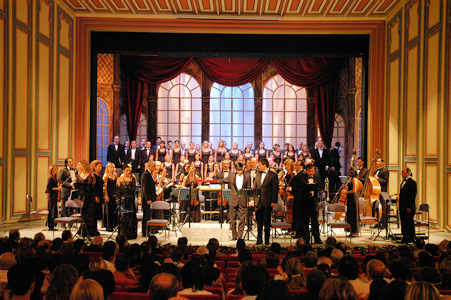Other Links
Editorial Board
- Editor - Bill Kenny
- London Editor-Melanie Eskenazi
- Founder - Len Mullenger
Google Site Search
SEEN
AND HEARD INTERNATIONAL CONCERT REVIEW
Mustafa Erdogan, Mevlana Oratorio:
Ankara State Opera Orchestra and Chorus, Concert Master: Tayfun
Bozok, 11.1.2008 (BM)
Article Links
:

2007 marked the 800th anniversary of the birth of the
great Sufi philosopher Mevlana Rumi (with UNESCO declaring an
official “Year of Mevlana”), who to this day remains among the
most popular poets world-wide, his teachings evoking a rapturous
voyage into infinite love. Mevlana advocated boundless tolerance,
affirmative reasoning, kindness, charity and perception through
love, thus addressing all peoples, regardless of their faith or
ethnic origin. He believed that all religions were more or less
true, and his death was the first and only time in history that
Muslims, Jews and Christians quarreled over the honor of carrying
a great man to his grave.
Mustafa Erdogan’s Mevlana Oratorio is a work that succeeds in
presenting Turkish themes and rhythms within a classical Western
form - the oratorio for orchestra, chorus and four soloists. All
the same, it didn’t quite seem to really take off at first, the
evening beginning with much fiddling with music stands which
hadn’t been adjusted properly in advance. What's more, it seemed
bizarre that in Turkey, home of the traditional ney flute,
the ney theme in the introduction should be played from a tape and
not live. Nonetheless, an initial mood of sheer melancholy was
soon dispelled by the soloists, and though one had the feeling
that the work could have done with a bit more variety – a duet or
an ensemble number as opposed to a sequence of two solos for each
of the four singers – the music developed an ever more haunting
quality as the oratorio unfolded. All of the soloists gave fine
performances, although soprano Sule Köken sounded just a tiny bit
harsh at times, with fervent singing from mezzo soprano
Ferda Yetiser and bass Sabri Karabudak, proving that a voice need
not qualify as “big” to be persuasive (assuming that the texts we
were hearing were about the ideal of infinite love described
above). However, the most exciting moments of the evening occurred
during the second solo with chorus by Murat Karahan, his graceful
tenor conveying a haunting poignancy so intense it felt almost
unbearable. This alone made the trip to Ankara worthwhile, and I
wager it would be nearly impossible for non-Turkish artists to
perform this piece. In these times of religious strife one can
only wish that its message could be spread all over the world.
Still, I wonder how the future of opera in Turkey will be
developing in general in the near future. Istanbul Opera and
Ankara Opera both had very competent and committed Italian
artistic directors, Fabrizio Ventura and Dario Lucantoni, both of
whom resigned last year citing utterly untenable circumstances –
such as being excluded from significant decisions pertaining to
artistic programming - making it impossible for them to do their
jobs properly. Links to Seen and Heard articles about their work
in Turkey can be found at the end of this review.)
This must have been a great loss for both companies involved, and
it will be interesting to see how it will effect artistic planning
and performance in coming seasons.
For now, Istanbul’s current artistic director, acclaimed Turkish
composer Selman Ada, has announced that he intends to curtail
spending on the popular annual summer festival in Aspendos on the
Mediterranean coast (saying in an interview with the Turkish
English-language daily “The New Anatolian” that it caters to
tourists such as “butchers and hairdressers” from northern Europe
rather than domestic audiences), and to stage all classical opera
repertoire in Turkish….not exactly most people’s idea of an
up-to-date creative approach, and hardly “politically correct”
(opera is only for university graduates?). Having said that,
Turkey is a fascinating country and it will be intriguing to see
what happens there next.
Bettina Mara
Picture
© Ankara Opera
Opera Is Booming in Turkey
The 13th Aspendos Opera and Ballet Festival
An Italian Conductor in Ankara
